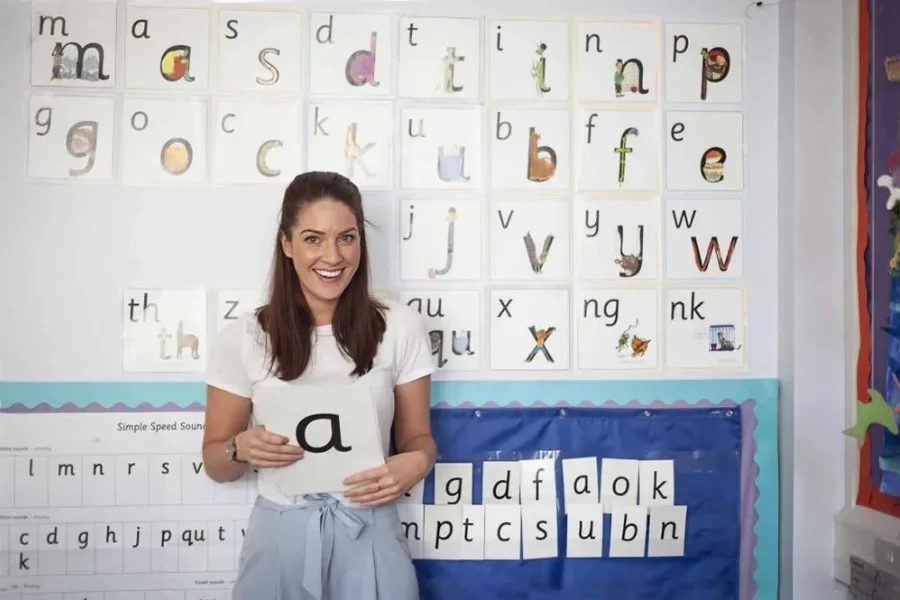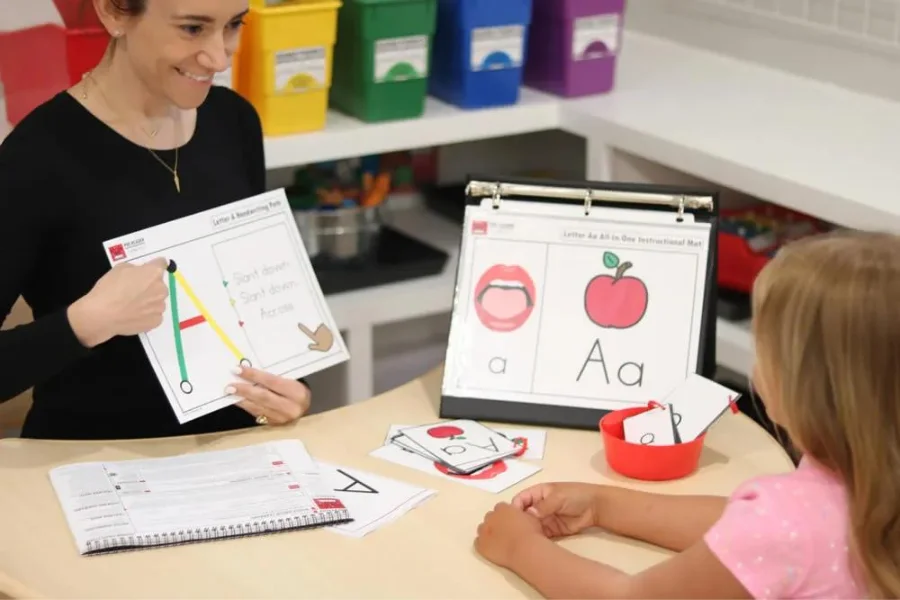Phonics Rules

Source: ruthmiskin
Phonics Rules
The foundation of learning to read and write in English, particularly for younger students, is the phonics principles. With this method, the English language is broken down into smaller, easier-to-understand chunks, which helps kid’s link letters and sounds to eventually form words.
We will examine the fundamental phonics principles in this blog, which may aid kids in acquiring good reading abilities and provide a firm basis for their academic journey. It is helpful for early learners as well as anybody wishing to improve their reading and writing skills in English to understand these guidelines.
Table of Content

Source: wilsonlanguage
Phonics Rules for Teachers
The role of phonics in literacy development is undeniable, and a deep understanding of phonics rules for teachers is essential for successful teaching. These rules not only aid in reading but also in spelling and comprehension.
Let’s delve deeper into the phonics rules, expanding upon their importance and application in the classroom:
Single Letter Sounds
Begin phonics education by focusing on the sounds each alphabet letter makes. This is the bedrock of phonics learning, providing the initial tools for decoding words.
Vowel Sounds
Emphasize the distinction between short and long vowel sounds. This differentiation is vital for reading accuracy and helps in understanding word structures.
Consonant Blends
Display children how to syndicate consonants that regularly occur together in words, as “st” in “stop” and “bl” in “black.” Articulation and reading eloquence depend on this thoughtfully.
Digraphs
Impart your learners about digraphs, which are made of two letters that sound like similar. Examples are ‘th’ in ‘this’ and ‘ch’ in ‘chop’. Understanding digraphs is neccesary for decoding various English spellings.
Silent ‘e’ Rule
Describe how a silent ‘e’ at the end of a word frequently causes the previous vowel to seem longer, as in ‘cap’ as opposed to ‘cape’. When it comes to words and their pronunciation in English, this standard is very important.
R-Controlled Vowels
Impart on the different sounds vowels generate when followed by an ‘r’, like ‘ar’ in ‘car’ or ‘or’ in ‘for’. These sounds are vital to English phonetics and can be tricky for students.
Our team is ready to assist with your queries on +919869866277 / +919869546913.
Please Click Here if you’d like to download our Phonics Course brochure.
Diphthongs
Highlight the blended sounds in diphthongs, such as ‘oi’ in ‘boil’ or ‘ou’ in ‘out’. These sounds are important for understanding the complexity of vowel sounds in English.
CVC Words
Emphasize consonant-vowel-consonant words, which help students practice basic decoding skills. Words like ‘cat’ or ‘bed’ are excellent for beginners.
Vowel Teams
Explain how pairs of vowels can work together to produce a single sound, like ‘ea’ in ‘team’ or ‘ai’ in ‘rain’. This rule is crucial for understanding many English words.
Soft C and G
Teach the soft sounds of ‘c’ (as in ‘city’) and ‘g’ (as in ‘giant’), and the conditions under which these sounds occur. This helps in differentiating words and improving spelling skills.
Hard C and G
Contrast the soft sounds with the hard sounds of ‘c’ (as in ‘cat’) and ‘g’ (as in ‘go’). Provide ample examples to reinforce the concept.
Syllable Rules
Break down multisyllabic words into syllables, highlighting the role of vowels in each syllable. This approach simplifies complex words, making them more manageable for young readers.
Affixes
Introduce common prefixes and suffixes, explaining how they alter the meanings and functions of base words. This knowledge is vital for vocabulary development.
Compound Words
Discuss how combining two words can create new meanings, such as ‘sunflower’ or ‘playground’. This understanding is important for vocabulary expansion and comprehension.
Consistent Practice
Reinforce the idea that regular practice is key to mastering these phonics rules for teachers and students. Consistent exposure and practice ensure that students internalize these rules and apply them effectively.
These expanded phonics rules for teachers are indispensable in the literacy journey. By thoroughly understanding and applying these rules, educators can significantly enhance their students’ reading, spelling, and comprehension skills. Phonics rules are the building blocks of literacy, and with the right instruction and practice, teachers can foster a lifelong love of reading and learning in their students.

Source: littlemindsetwork
Our team is ready to assist with your queries on +919869866277 / +919869546913.
Please Click Here if you’d like to download our Phonics Course brochure.
Online Phonics Course
In the realm of literacy education, the demand for effective phonics instruction has led to the emergence of numerous online phonics courses. Among these, Vidhyanidhi Education Society (VES) stands out with its exceptional Online Phonics Course. This course not only equips educators with the necessary skills but also provides extensive resources to start their own phonics classes.
Let’s explore the highlights of VES’s comprehensive program:
Guidelines for Starting Phonics Classes
VES offers detailed guidelines to help educators initiate their phonics classes for children. This is a critical component for those looking to establish their own teaching practice.
Teachers Handbook
The course includes a comprehensive handbook for teachers, covering all aspects of phonics teaching methodologies and practices.
Extensive Printable Worksheets
With over 300 ready-to-use printable worksheets, this Online Phonics Course provides ample material to jumpstart your teaching career. These worksheets are designed to reinforce learning effectively.
Printable Flashcards
The course offers 42 printable flashcards. These visual aids are invaluable tools in teaching phonics, making learning engaging and effective.
Word Bank
An extensive word bank with over 650 words is included. This collection encompasses digraphs, alternative vowel sounds (like ai, oa, ay, ow, ei, etc.), and CVC words, providing a rich resource for teaching.
Additional Teaching Handouts
Various handouts supplement the teaching process, adding value to the educational experience.
Day-wise Lesson Execution Tips
The course provides practical tips for executing lessons on a day-to-day basis, ensuring a structured and efficient teaching approach.
Widely Accepted Certification
Upon completion, participants receive a widely recognized certificate, adding credibility and recognition to their teaching profile.
Intensive Training
The Online Phonics Course entails 18 hours of intensive training, ensuring comprehensive coverage of all necessary skills and knowledge.
UK-Based Synthetic Phonics Methodology
The course follows the popular UK-based Synthetic Phonics Teaching and Learning Methodology, a proven approach in phonics education.
Audio-Visual Teaching Aids
Lectures are enhanced with the use of audio-visual teaching aids, making the learning experience more dynamic and engaging.
Jingles, Stories, and Actions
Demonstrations include the use of jingles, stories, and actions, facilitating a fun and interactive learning environment.
Thorough Practice of 42 Sounds
The program ensures thorough practice of all 42 sounds, including letter sounds and digraphs, crucial for phonics education.
Mock-Drills and Interactive Sessions
Mock-drills and doubt-solving sessions are incorporated, providing hands-on experience and clarifying any queries.
The Online Phonics Course offered by Vidhyanidhi Education Society is a robust program, blending theoretical knowledge with practical tools. It stands as an exemplary choice for educators and aspiring phonics instructors globally. With its rich content and practical orientation, this course is poised to empower educators, enabling them to impart effective phonics education to young learners.
“Join VES’s Phonics Course now – Unlock a world of teaching success!”
Our team is ready to assist with your queries on +919869866277 / +919869546913.
Please Click Here if you’d like to download our Phonics Course brochure.
FAQs
How to Become a Certified Phonics Teacher?
Become a certified Phonics teacher by enrolling in the Phonics Teacher Training Program at Vidhyanidhi Education Society.
How long does it take to be a Phonics Teacher?
Just 18 hours of intensive training are needed to become a skilled Phonics Teacher.
Which is Best Phonics Course?
The best Phonics Course is offered by Vidhyanidhi Education Society, renowned for its excellence.




